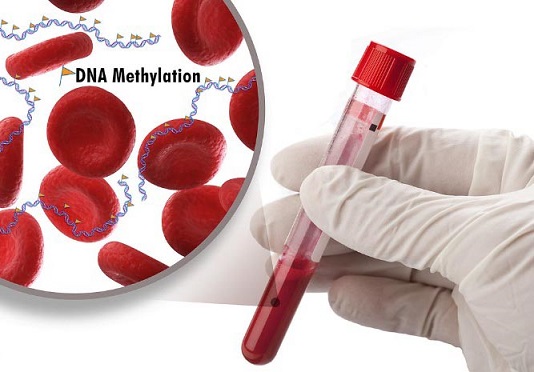COVID-19 causes Blood DNA Methylation, a potential biomarker for Long COVID severity
Nikhil Prasad Fact checked by:Thailand Medical News Team Jul 22, 2024 1 year, 1 month, 3 weeks, 15 hours, 15 minutes ago
COVID-19 News: In a groundbreaking study, researchers have discovered that COVID-19 can cause changes in blood DNA methylation, a process that could serve as a biomarker for the severity of Long COVID. This
COVID-19 News report delves into the study's findings, providing insights into how these molecular changes might help diagnose and understand the long-term effects of the virus.
 COVID-19 causes Blood DNA Methylation, a potential biomarker for Long COVID severity
Understanding DNA Methylation
COVID-19 causes Blood DNA Methylation, a potential biomarker for Long COVID severity
Understanding DNA Methylation
DNA methylation is an epigenetic modification where a methyl group is added to the DNA molecule, often affecting gene expression without changing the DNA sequence itself. This process is crucial for regulating various biological functions and responding to environmental changes. In the context of COVID-19, researchers have been keen to explore how the virus might alter DNA methylation patterns and what this means for patients suffering from Long COVID.
The Study and Its Significance
Conducted by a team of researchers from Albany Medical Center-USA, Albany Medical College-USA, the University of Wisconsin-USA, and Temple University-USA, this study focused on examining DNA methylation in the blood of individuals who experienced post-acute sequelae of COVID-19 (PASC), commonly known as Long COVID.
Methodology
The researchers enrolled 103 patients with PASC, 15 patients who had recovered from COVID-19 without PASC, and 27 healthy volunteers. Using whole-genome methylation sequencing, they analyzed the DNA methylation patterns in blood samples from these participants. The goal was to identify specific changes that could differentiate those with Long COVID from the other groups.
Key Findings
The study revealed 39 differentially methylated regions (DMRs) specific to PASC. These regions showed consistent differences in methylation patterns, distinguishing Long COVID patients from both healthy individuals and those who recovered without long-term symptoms. Interestingly, these DMRs were linked to genes involved in circadian rhythm regulation and other critical biological processes.
Examples of Differentially Methylated Regions (DMRs)
-DMRs in Genes Regulating Circadian Rhythm
One of the significant findings was the identification of DMRs in genes that regulate circadian rhythm, such as the BMAL1 gene. Circadian rhythm genes are responsible for maintaining the body's internal clock, which regulates sleep-wake cycles and other vital functions. Alterations in the methylation of these genes could explain some of the common symptoms of Long COVID, such as sleep disturbances and chronic fatigue.
Effect: Disruption in sleep patterns and increased fatigue.
Implications: This finding suggests that targeting circadian rhythm pathways might help alleviate some of
the debilitating symptoms of Long COVID.
-DMRs in Inflammatory Response Genes
Another example includes DMRs found in genes associated with the body's inflammatory response, such as the MITF gene. MITF plays a role in regulating the immune response and has been linked to the severity of COVID-19 infection.
Effect: Altered immune response, potentially leading to prolonged inflammation and related symptoms.
Implications: Understanding these methylation changes could lead to new therapeutic strategies to modulate the immune response in Long COVID patients.
-DMRs in Neurotransmitter Regulation Genes
The study also found DMRs in genes involved in neurotransmitter regulation, which can affect cognitive functions and mood. For instance, changes in the methylation of the FANK1 gene were observed.
Effect: Cognitive dysfunction, memory issues, and mood disorders, which are common in Long COVID.
Implications: These findings point to the potential for developing treatments that target these neurotransmitter pathways to improve cognitive and psychological symptoms in Long COVID patients.
Machine Learning and Quality of Life
To further understand the implications of these findings, the researchers employed machine learning algorithms. They found 28 unique differentially methylated positions (DMPs) in the genome that could stratify PASC patients based on their quality of life scores. This suggests that DNA methylation patterns could potentially be used to predict the severity of Long COVID symptoms.
Implications for Diagnosis and Treatment
The identification of these specific DNA methylation changes opens new avenues for diagnosing Long COVID. By developing a reliable biomarker based on these methylation patterns, healthcare providers could more accurately identify patients at risk of severe Long COVID symptoms and tailor treatments accordingly.
Future Directions
The study's findings highlight the need for further research to validate these biomarkers and explore their potential in clinical settings. Future studies could investigate how these methylation changes evolve over time and whether they can be reversed with specific treatments.
Conclusion
This pioneering research underscores the significant impact of COVID-19 on our genetic makeup, specifically through DNA methylation. By identifying biomarkers for Long COVID severity, this study paves the way for improved diagnosis, treatment, and understanding of this debilitating condition.
The study findings were published in the peer-reviewed journal: eBioMedicine.
https://www.thelancet.com/journals/ebiom/article/PIIS2352-3964(24)00287-1/fulltext
For the latest
COVID-19 News, keep on logging to Thailand Medical News.
Read Also:
https://www.thailandmedical.news/news/yale-researchers-warn-of-dna-methylation-dysregulation-in-long-covid
https://www.thailandmedical.news/news/breaking-news-even-asymptomatic-sars-cov-2-infections-cause-dna-methylation-and-epigenetic-changes,-leading-to-immune-dysregulation
